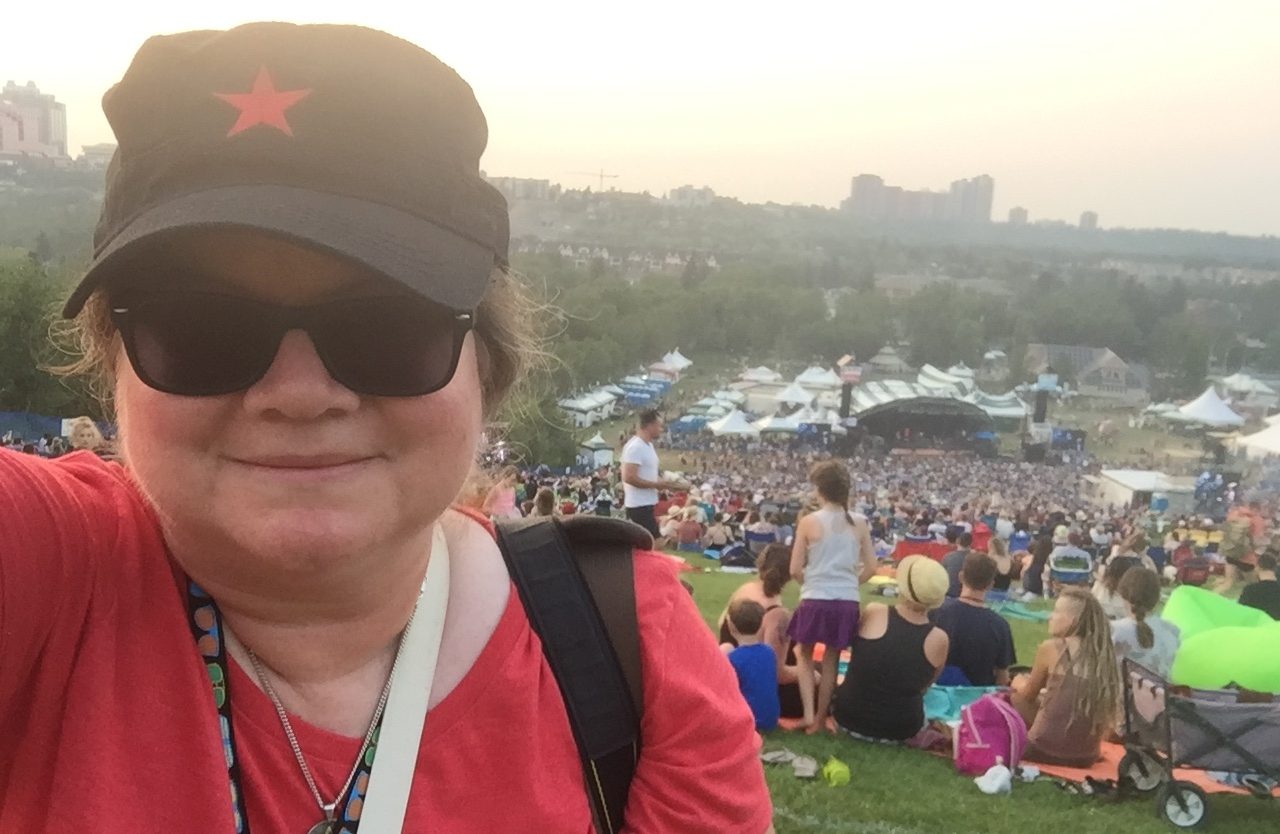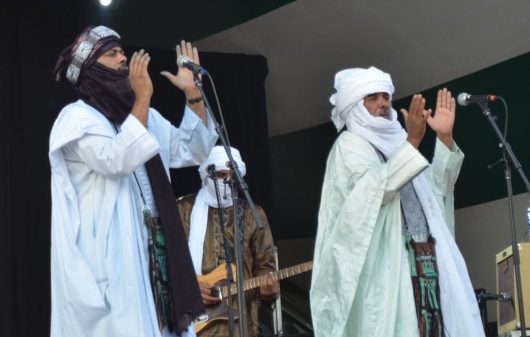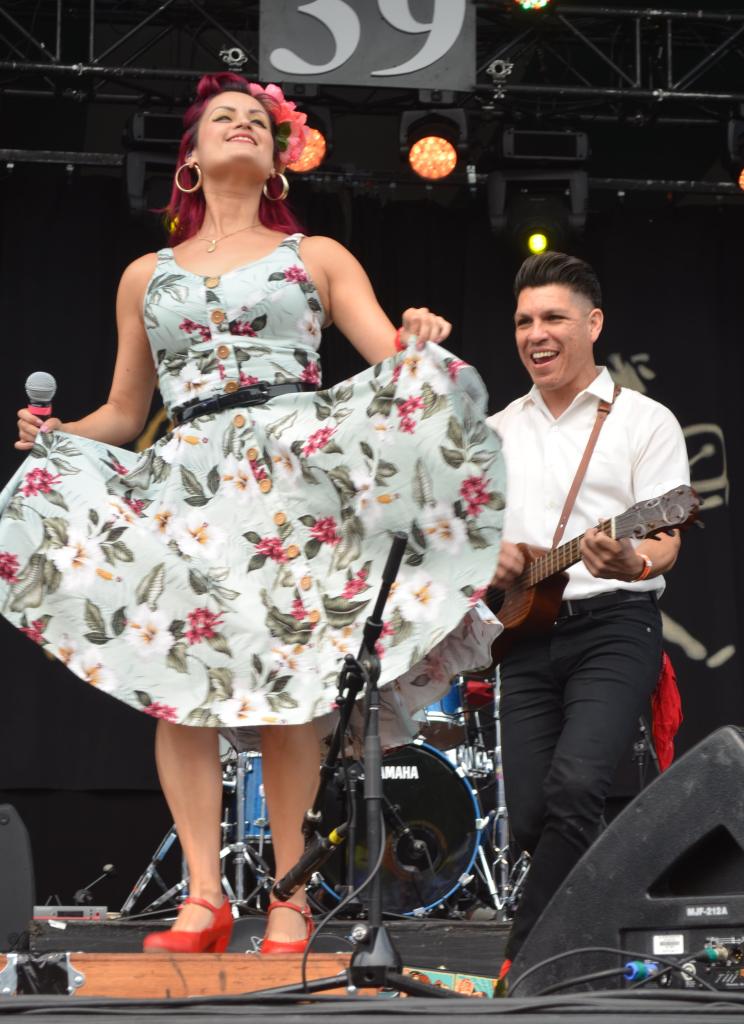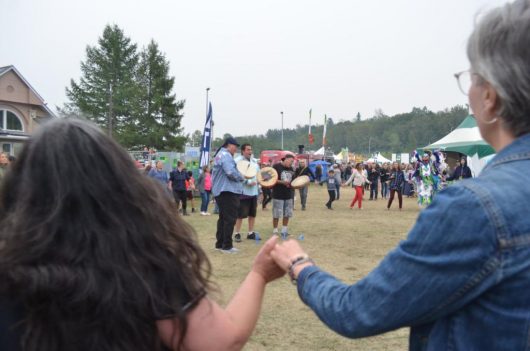I SURVIVED THE FOLK FEST (almost)
Posted on August 12, 2018 By Paula E. Kirman Entertainment, Front Slider, Music, news
 Whoever came up with the saying “If you don’t like the weather in Alberta, just wait 10 minutes!” must have been at the Edmonton Folk Music Festival.
Whoever came up with the saying “If you don’t like the weather in Alberta, just wait 10 minutes!” must have been at the Edmonton Folk Music Festival.
Diehard festival fans all have stories about the erratic weather over the years, some which resemble battlefields. They make sure they have all the necessary gear and protective wear, place their tarps on the hill, and stick to their posts, come hell or high water. This year, it was both.
From hot and smoky to wet and cold, I can say first-hand that 2018 marked the strangest weather fluctuations of the festival in the close to decade in which I have attended regularly. A couple of times it’s been cloudy, and people have broken out their umbrellas during a brief cloudburst, but otherwise it’s been pretty steady. The exception was last year when the Thursday night was cut short due to an intense storm with winds strong enough to rotate some of the speakers on the main stage and send giant TV screens flapping around on the hill. The show from the Decemberists was cancelled, and the band was invited back to play this year – a highlight I’d been waiting for all year.
But that was just one night. This year, every day came with its challenges. Thursday was blazingly hot – something like +34 with added humidity. So hot that even when sitting in the shaded media tent with large fans blowing, my fingers were sticking to the keys of my laptop and my bottom area was totally wet from sitting. I tried to move as little as possible, drank lots of water, and ate ice cream. It’s amazing what a person will endure when they are motivated. I have friends with severe asthma who went on both Thursday and Friday evenings, even though the air quality was maxed out because of smoke drift from B.C. wildfires. It was like being on Mars.
 Yet I am one of those people who would rather it be +30 than -30. And nothing – and I mean nothing – was going to keep me from seeing Buffy Sainte-Marie. Her music and activism have been an inspiration to me throughout my entire life. Also, by the time she took the stage on Thursday, the sun was on its way down and the hill was cooling off. Earlier, when Tinariwen – a guitar band from Mali in West Africa – played the first main stage concert of the evening, the heat was intense. When I saw the musicians in their traditional desert clothing, designed to offer protection from wind and sand, I imagine they probably thought our unusually high temperatures were nothing, or at least very average.
Yet I am one of those people who would rather it be +30 than -30. And nothing – and I mean nothing – was going to keep me from seeing Buffy Sainte-Marie. Her music and activism have been an inspiration to me throughout my entire life. Also, by the time she took the stage on Thursday, the sun was on its way down and the hill was cooling off. Earlier, when Tinariwen – a guitar band from Mali in West Africa – played the first main stage concert of the evening, the heat was intense. When I saw the musicians in their traditional desert clothing, designed to offer protection from wind and sand, I imagine they probably thought our unusually high temperatures were nothing, or at least very average.
A major aspect of the Folk Fest is social. Some friends only see each other once a year in Gallagher Park. You get to know your tarp neighbours on the hill. I experienced this camaraderie as well – in the taxi line up. Standing in the dark for 45 minutes certainly did not warm the cockles of my heart, but it made for some interesting conversations, specifically about how the transportation situation was markedly worse than years past. Usually the cabs keep coming and coming throughout the evening. Not that Thursday, though. Traffic congestion leading up to the taxi stand and drivers picking up rides before reaching the stand resulted in a dearth of cabs. Lesson learned: leave earlier, even if your favourite band is still playing. They’re going to have an LRT station near here in 2020.
 Saturday started off well enough. Temperatures cooled down to the lower 20s and much of the smoke diminished. It made walking around throughout Gallagher Park very pleasant. I arrived just in time to take in the 2 p.m. main stage. CKUA’s Lark Clark introduced Las Cafeteras (right) by saying that “culture is a path to peace.” Hailing from East L.A., the band presents social commentary about the contemporary experiences of the Latino community in Trump’s America, with an energetic sound that incorporates “son jarocho” influence and instruments from Spanish, Indigenous, and African musical traditions. Dance was also a very big part of the band’s performance, with several members creating part of the rhythm section by using a stomp box. Very exciting, very memorable, very relevant.
Saturday started off well enough. Temperatures cooled down to the lower 20s and much of the smoke diminished. It made walking around throughout Gallagher Park very pleasant. I arrived just in time to take in the 2 p.m. main stage. CKUA’s Lark Clark introduced Las Cafeteras (right) by saying that “culture is a path to peace.” Hailing from East L.A., the band presents social commentary about the contemporary experiences of the Latino community in Trump’s America, with an energetic sound that incorporates “son jarocho” influence and instruments from Spanish, Indigenous, and African musical traditions. Dance was also a very big part of the band’s performance, with several members creating part of the rhythm section by using a stomp box. Very exciting, very memorable, very relevant.
Many of my favourite folk fest moments take place on the side stages. This is where musically-diverse acts take part in workshops where they jam, and where non-headliners play their full concerts in a much more intimate setting. It was here that I was introduced to the subtle and profound songs of Halifax’s Jenn Grant, who was recommended by a friend. Grant was followed by The Wailin’ Jennys from Winnipeg, in the band’s first EFMF since 2006. Stage 7, one of the smaller areas, was absolutely packed, with fans sitting beyond the fenced area. The band’s beautiful harmonies reached the back of the park.
A stand-out memory for me from Saturday afternoon will be hearing drumming from near the stage where I was waiting for The Wailin’ Jenny’s to start, and going out to explore the sound to find an Indigenous drum group and dancer right there in the middle of the park. They ended their impromptu set with a round dance, which was quite the moment of bringing people from all cultures together – I had tears in my eyes and it wasn’t because of any lingering smoke in the air.
 All good things, as they say, must come to an end. When the wind started kicking up around 6 p.m., I knew something wet was afoot. The precipitation started with a trickle, then stopped, then trickled again harder, then stopped, then went full-on rain. From way too hot the day before, I went from chilly to freezing in about 20 minutes, and despite my fear of missing out I decided to call it an early night – and indeed that was it for me for the 2018 folk fest, especially with the steady rain and cold on Sunday. What can I say? I am not as hardy when it comes to rain. I was apparently not the only one. A young woman at the taxi line up said sitting out in the rain was just no fun, unless there was “someone I absolutely couldn’t live without seeing.”
All good things, as they say, must come to an end. When the wind started kicking up around 6 p.m., I knew something wet was afoot. The precipitation started with a trickle, then stopped, then trickled again harder, then stopped, then went full-on rain. From way too hot the day before, I went from chilly to freezing in about 20 minutes, and despite my fear of missing out I decided to call it an early night – and indeed that was it for me for the 2018 folk fest, especially with the steady rain and cold on Sunday. What can I say? I am not as hardy when it comes to rain. I was apparently not the only one. A young woman at the taxi line up said sitting out in the rain was just no fun, unless there was “someone I absolutely couldn’t live without seeing.”
Many stayed and prevailed. They had the privilege of seeing Regina Spektor and Ry Cooder, with the scheduled Sunday mainstage acts Nick Mulvey, Shakey Graves and the Milk Carton Kids to come. Fans were wet, but happy. Rain could not dampen their joy. The weather did not win. All that’s left to do now is gear up for next year’s battle, and be optimistic that a more even-tempered climate will prevail.













